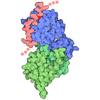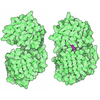[English] 日本語
 Yorodumi
Yorodumi- PDB-7k2e: Kelch domain of human KEAP1 bound to Nrf2-based cyclic peptide, c... -
+ Open data
Open data
- Basic information
Basic information
| Entry | Database: PDB / ID: 7k2e | ||||||
|---|---|---|---|---|---|---|---|
| Title | Kelch domain of human KEAP1 bound to Nrf2-based cyclic peptide, c[GDEETGE] | ||||||
 Components Components |
| ||||||
 Keywords Keywords | PROTEIN BINDING/Inhibitor / Peptide inhibitor / Inhibitor complex / Loop-mimic / PROTEIN BINDING / cyclic peptide / PROTEIN BINDING-Inhibitor complex | ||||||
| Function / homology |  Function and homology information Function and homology informationregulation of epidermal cell differentiation / Nuclear events mediated by NFE2L2 / negative regulation of response to oxidative stress / Cul3-RING ubiquitin ligase complex / ubiquitin-like ligase-substrate adaptor activity / transcription regulator inhibitor activity / inclusion body / cellular response to interleukin-4 / actin filament / centriolar satellite ...regulation of epidermal cell differentiation / Nuclear events mediated by NFE2L2 / negative regulation of response to oxidative stress / Cul3-RING ubiquitin ligase complex / ubiquitin-like ligase-substrate adaptor activity / transcription regulator inhibitor activity / inclusion body / cellular response to interleukin-4 / actin filament / centriolar satellite / disordered domain specific binding / KEAP1-NFE2L2 pathway / positive regulation of proteasomal ubiquitin-dependent protein catabolic process / Antigen processing: Ubiquitination & Proteasome degradation / Neddylation / cellular response to oxidative stress / ubiquitin-dependent protein catabolic process / midbody / in utero embryonic development / Potential therapeutics for SARS / proteasome-mediated ubiquitin-dependent protein catabolic process / RNA polymerase II-specific DNA-binding transcription factor binding / Ub-specific processing proteases / regulation of autophagy / protein ubiquitination / negative regulation of transcription by RNA polymerase II / endoplasmic reticulum / nucleoplasm / identical protein binding / cytosol / cytoplasm Similarity search - Function | ||||||
| Biological species |  Homo sapiens (human) Homo sapiens (human) | ||||||
| Method |  X-RAY DIFFRACTION / X-RAY DIFFRACTION /  SYNCHROTRON / SYNCHROTRON /  MOLECULAR REPLACEMENT / Resolution: 2.03 Å MOLECULAR REPLACEMENT / Resolution: 2.03 Å | ||||||
 Authors Authors | Muellers, S.N. / Allen, K.N. | ||||||
 Citation Citation |  Journal: J.Am.Chem.Soc. / Year: 2021 Journal: J.Am.Chem.Soc. / Year: 2021Title: Recapitulating the Binding Affinity of Nrf2 for KEAP1 in a Cyclic Heptapeptide, Guided by NMR, X-ray Crystallography, and Machine Learning. Authors: Ortet, P.C. / Muellers, S.N. / Viarengo-Baker, L.A. / Streu, K. / Szymczyna, B.R. / Beeler, A.B. / Allen, K.N. / Whitty, A. | ||||||
| History |
|
- Structure visualization
Structure visualization
| Structure viewer | Molecule:  Molmil Molmil Jmol/JSmol Jmol/JSmol |
|---|
- Downloads & links
Downloads & links
- Download
Download
| PDBx/mmCIF format |  7k2e.cif.gz 7k2e.cif.gz | 260.8 KB | Display |  PDBx/mmCIF format PDBx/mmCIF format |
|---|---|---|---|---|
| PDB format |  pdb7k2e.ent.gz pdb7k2e.ent.gz | 187.6 KB | Display |  PDB format PDB format |
| PDBx/mmJSON format |  7k2e.json.gz 7k2e.json.gz | Tree view |  PDBx/mmJSON format PDBx/mmJSON format | |
| Others |  Other downloads Other downloads |
-Validation report
| Arichive directory |  https://data.pdbj.org/pub/pdb/validation_reports/k2/7k2e https://data.pdbj.org/pub/pdb/validation_reports/k2/7k2e ftp://data.pdbj.org/pub/pdb/validation_reports/k2/7k2e ftp://data.pdbj.org/pub/pdb/validation_reports/k2/7k2e | HTTPS FTP |
|---|
-Related structure data
| Related structure data | 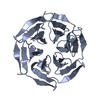 7k28C 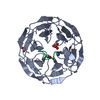 7k29C 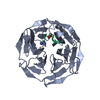 7k2aC 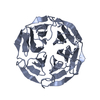 7k2bC 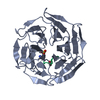 7k2cC 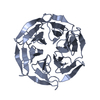 7k2dC  7k2fC  7k2gC  7k2hC 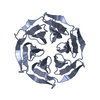 7k2iC 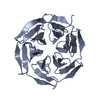 7k2jC 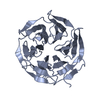 7k2kC  7k2lC  7k2mC 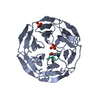 7k2nC 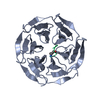 7k2oC 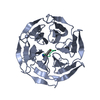 7k2pC 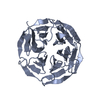 7k2qC  7k2rC  7k2sC 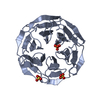 5wflS S: Starting model for refinement C: citing same article ( |
|---|---|
| Similar structure data |
- Links
Links
- Assembly
Assembly
| Deposited unit | 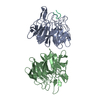
| ||||||||||||
|---|---|---|---|---|---|---|---|---|---|---|---|---|---|
| 1 | 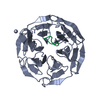
| ||||||||||||
| 2 | 
| ||||||||||||
| Unit cell |
|
- Components
Components
| #1: Protein | Mass: 33005.934 Da / Num. of mol.: 2 Source method: isolated from a genetically manipulated source Source: (gene. exp.)  Homo sapiens (human) / Gene: KEAP1, INRF2, KIAA0132, KLHL19 / Production host: Homo sapiens (human) / Gene: KEAP1, INRF2, KIAA0132, KLHL19 / Production host:  #2: Protein/peptide | | Mass: 735.652 Da / Num. of mol.: 1 / Source method: obtained synthetically / Source: (synth.)  Homo sapiens (human) Homo sapiens (human)#3: Water | ChemComp-HOH / | |
|---|
-Experimental details
-Experiment
| Experiment | Method:  X-RAY DIFFRACTION / Number of used crystals: 1 X-RAY DIFFRACTION / Number of used crystals: 1 |
|---|
- Sample preparation
Sample preparation
| Crystal | Density Matthews: 3.02 Å3/Da / Density % sol: 59.3 % |
|---|---|
| Crystal grow | Temperature: 295 K / Method: vapor diffusion, hanging drop Details: 1.2 - 1.5 M Ammonium Sulfate, 0.5-0.7% PEG-MME-550, 0.1 M Bis-Tris pH = 6.0 - 6.5 |
-Data collection
| Diffraction | Mean temperature: 100 K / Serial crystal experiment: N |
|---|---|
| Diffraction source | Source:  SYNCHROTRON / Site: SYNCHROTRON / Site:  NSLS-II NSLS-II  / Beamline: 17-ID-1 / Wavelength: 0.9201 Å / Beamline: 17-ID-1 / Wavelength: 0.9201 Å |
| Detector | Type: DECTRIS EIGER X 9M / Detector: PIXEL / Date: Oct 24, 2018 |
| Radiation | Protocol: SINGLE WAVELENGTH / Monochromatic (M) / Laue (L): M / Scattering type: x-ray |
| Radiation wavelength | Wavelength: 0.9201 Å / Relative weight: 1 |
| Reflection | Resolution: 2.03→29.31 Å / Num. obs: 48405 / % possible obs: 98.91 % / Redundancy: 2 % / Biso Wilson estimate: 36.38 Å2 / CC1/2: 0.998 / CC star: 0.999 / Rmerge(I) obs: 0.04294 / Rpim(I) all: 0.04294 / Rrim(I) all: 0.06073 / Net I/σ(I): 11.22 |
| Reflection shell | Resolution: 2.031→2.104 Å / Redundancy: 1.9 % / Rmerge(I) obs: 0.4453 / Mean I/σ(I) obs: 1.88 / Num. unique obs: 4659 / CC1/2: 0.726 / CC star: 0.917 / Rpim(I) all: 0.4453 / Rrim(I) all: 0.6297 / % possible all: 95.42 |
- Processing
Processing
| Software |
| |||||||||||||||||||||||||||||||||||||||||||||||||||||||||||||||||||||||||||||||||||||||||||||||||||||||||
|---|---|---|---|---|---|---|---|---|---|---|---|---|---|---|---|---|---|---|---|---|---|---|---|---|---|---|---|---|---|---|---|---|---|---|---|---|---|---|---|---|---|---|---|---|---|---|---|---|---|---|---|---|---|---|---|---|---|---|---|---|---|---|---|---|---|---|---|---|---|---|---|---|---|---|---|---|---|---|---|---|---|---|---|---|---|---|---|---|---|---|---|---|---|---|---|---|---|---|---|---|---|---|---|---|---|---|
| Refinement | Method to determine structure:  MOLECULAR REPLACEMENT MOLECULAR REPLACEMENTStarting model: 5WFL Resolution: 2.03→29.31 Å / SU ML: 0.2627 / Cross valid method: FREE R-VALUE / σ(F): 1.36 / Phase error: 26.2572 Stereochemistry target values: GeoStd + Monomer Library + CDL v1.2
| |||||||||||||||||||||||||||||||||||||||||||||||||||||||||||||||||||||||||||||||||||||||||||||||||||||||||
| Solvent computation | Shrinkage radii: 0.9 Å / VDW probe radii: 1.11 Å / Solvent model: FLAT BULK SOLVENT MODEL | |||||||||||||||||||||||||||||||||||||||||||||||||||||||||||||||||||||||||||||||||||||||||||||||||||||||||
| Displacement parameters | Biso mean: 58.86 Å2 | |||||||||||||||||||||||||||||||||||||||||||||||||||||||||||||||||||||||||||||||||||||||||||||||||||||||||
| Refinement step | Cycle: LAST / Resolution: 2.03→29.31 Å
| |||||||||||||||||||||||||||||||||||||||||||||||||||||||||||||||||||||||||||||||||||||||||||||||||||||||||
| Refine LS restraints |
| |||||||||||||||||||||||||||||||||||||||||||||||||||||||||||||||||||||||||||||||||||||||||||||||||||||||||
| LS refinement shell |
|
 Movie
Movie Controller
Controller


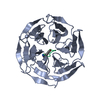
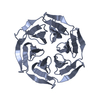


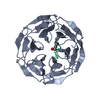
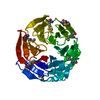


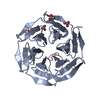
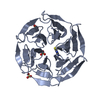
 PDBj
PDBj
